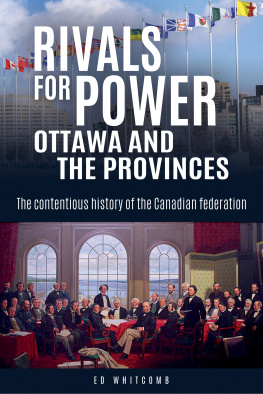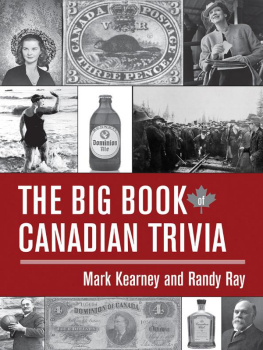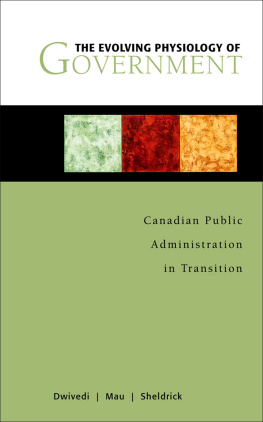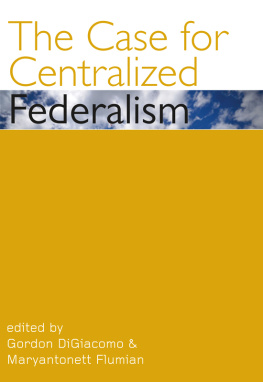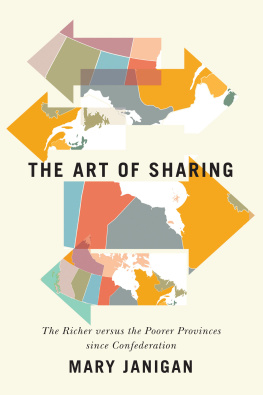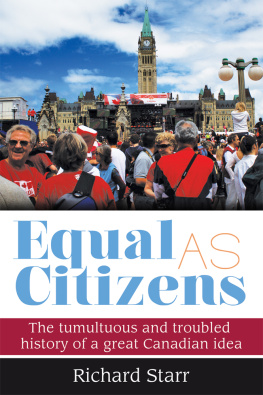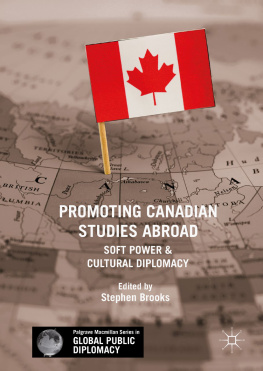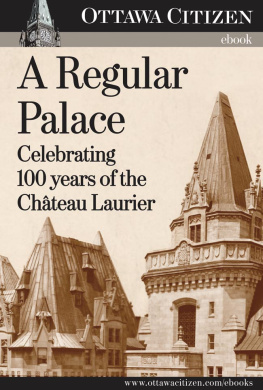Preface
On July 1, 2017, Canadians will celebrate the 150th anniversary of Confederation. My contribution to that celebration is this history of Canadian federalism since 1867. It covers the background, the British North America Act , the union of the colonies, and how federalism has evolved over fifteen decades. It is a work of passion, because I cannot remember a time when I was not interested in the elements that went into making Canada a federal state.
In the 1950s, I travelled across western Canada with my parents and noted that the provinces did things differently. In Grade 8, I wrote an essay arguing that Louis Riel should be regarded as a Father of Confederation. In high school, I was well aware that Manitoba was responsible for our education and that Ottawa was responsible for the nearby Indian reserve, and I vaguely grasped that neither were working particularly well. At university, a number of courses in political science, history, and economics informed me about federalism, politics, government, administration, and the relations between central governments and regions in a variety of countries and empires.
As a European historian, I spent four years in England and France and travelled all over western Europe, noting things like the independence movements in Scotland and Brittany and the way the Swiss seemed to make a multinational country run as smooth as, well, a Swiss clock. I studied and lectured on the functioning of government, the creation and disintegration of countries, on civil wars, on the rise of nationalism, and on the differences between a unitary state such as France and the loose German federation with its many independent states. That academic career also led me to jobs in Nova Scotia and Quebec, which provided intellectual and other challenges for a lad from the prairies.
It is often said that federalism is the most talked-about issue in Canadian politics. One small example of this is that during my first week in the Foreign Service in 1975, a number of new officers were discussing Confederation; I clearly remember attempting to correct the one who said that Quebec had been forced to join the Dominion. The Department of Foreign Affairs had an office dealing with the provinces, and I considered an assignment there or a secondment to one of the provincial departments of intergovernmental affairs. Neither ambition came to fruition, but they certainly indicated a strong interest in federalism. The Foreign Service took me to four federal statesYugoslavia, Indonesia, India, and of course Canada (Ottawa), all of which had significant problems between the centre and the provinces and among the provinces, all of which handled centre-regional relations differently. Foreign affairs involves many domestic issues, and I was desk officer for international energy when the Canadian government brought in the National Energy Program, an issue covered in detail in this book.
In that diplomatic career, I spent two decades reporting on insurrections, terrorism, and the efforts of dominant groups to impose their will on minorities and the resistance of the latter to those attempts. Issues such as those were major elements of my third career as the federal governments senior intelligence analyst for South and Southeast Asia. Afghanistan, Pakistan, India, and Sri Lanka all suffered from serious regional, religious, and ethnic divisions that cried out for decentralized government, but, in all four, over-centralization produced insurrection and civil war. Overall, I lived in four Canadian provinces and six foreign countries, and travelled extensively through most of Canada and fifty countries on five continents. While I did not make my career teaching federalism at a Canadian university, I did study it for five decades and from a hundred different perspectives around the world.
Studying the history of Canadas provinces became a hobby when I changed careers in 1975, and in 1982 I published A Short History of Manitoba. That book must have interested others, because over nine thousand copies have been sold and it has been used in schools and universities. As retirement approached, I resumed work on the plan to publish histories of all the provinces, starting with Alberta and Saskatchewan in 2005 and finishing with Quebec in 2012. Each province entered Confederation by a different path, and each has had a different relationship with Ottawa. The knowledge of centre-state relations gained in a variety of countries helped me understand the evolution of centre-provincial relations in Canada, and the research for the provincial histories revealed both the broad thrust of Canadas federalism and the specific issues in each provinces relations with Ottawa.
When the series was complete, the logical next step was a history of one of the most important themes in all those provincial histories, namely their relationship with the central government. The timing was perfect as retirement allowed Canadian history to become my fourth career. And the 150th anniversary of Confederation, when many Canadians might want to see a history of federalism written from a perspective that included studies of all of Canadas provinces and five centuries of centre-regional relations all over the globe, was just five years in the future.
Retirement allowed me to take a fairly exhaustive look at the literature, academic and otherwise, of some rather complicated aspects of Canadian federalism, such as the important court cases, constitutional issues such as the spending power, the complexities of health and welfare programs, fiscal federalism, and Quebec separatism. Fortunately, Canada has been gifted with wonderful academics who have spent their careers delving into these mysteries and presenting them in ways people can understand. I had the time to peruse this literature, but whether I grasped their analysis is up to the reader to determine.
The result of all this is Rivals for Power: Ottawa and the Provinces: The contentious history of the Canadian federation. It also reflects conversations and communications with dozens of friends, colleagues, academics, and journalists over a very long period. Many of them helped in a variety of ways, commenting in detail on one or more chapters, providing general comments about the project or parts of it, offering advice on all manner of issues, and giving the encouragement that is essential for a project like this. They include Dr. Jim Bickerton, Marc Bourie, Dr. R. Matthew Bray, Dr. Jorg Broschek, Clark Brownlee, Don Buckingham, Poppy Cummings, Dr. Adrian de Hoog, Dr. Janet Epp, Dr. Gerald Friesen, Dr. James Hiller, Dr. Harvey Lazar, Dr. Dan Livermore, David Malone, Dr. James McKillip, Dr. Peter Meekinson, Dr. Jim Mitchel, Rodney Mykle, Gar Pardy, Bob Plamandon, Margaret Poetschke, Robert Poetschke, Colin Robertson, Dr. Donald Savoie, Paul Turcot, Dr. Bill Waiser, Dr. Nelson Wiseman, and Dr. Donna Wood. Not specifically identified are about four dozen people who helped with the ten provincial histories and whose contribution is acknowledged in those books. James Lorimer and Laura Cook at Lorimer Publishers were particularly helpful. Of special importance was the helpfulness, professionalism, and friendliness of the staff of the Ottawa Public Library. My wife Kai and daughters Denise and Diana exhibited great patience and provided much support as this project unfolded.

